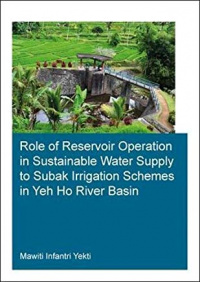Role of Reservoir Operation in Sustainable Water Supply to Subak Irrigation Schemes in Yeh Ho River Basin: Development of Subak Irrigation Schemes: ... in Bali (IHE Delft PhD Thesis Series)
- Title
- Role of Reservoir Operation in Sustainable Water Supply to Subak Irrigation Schemes in Yeh Ho River Basin: Development of Subak Irrigation Schemes: ... in Bali (IHE Delft PhD Thesis Series)
- Original language
- Author(s)
- Illustrator(s)
- Publisher
- CRC Press
- ISBN
- —
- Publication date
- July 9, 2017
- Subjects
- subak
- Find Book
- Related Env. Initiatives
- Related Places
- Related Biographies
- Related Children's Books
- Related Holidays
- Related Folktales
- Related Comics
- Related Lontar
- Linked words
Description(s)
Quantitative research with respect to the combination of engineering and socialcultural- religious aspects based on the Tri Hita Karana philosophy in Subak irrigation schemes is original in the field of land and water development. A scenario analysis needs a good and careful system approach. Based on a Generic Algorithm the RIBASIM model was applied using the dependable 80% of discharge and shifting the start of land preparation. The results provide evidence that the cropping pattern of the fifth scenario results in an overall optimal agriculture production of the Subak schemes. The recoverable flow considered in the river basin scheme model plays an important role in the optimisation. Nevertheless, if a normal hydro-climate occurs, the other scenarios, especially the first scenario, can be applied as well. When the indigenous knowledge of farmers is compromised with present day knowledge of agricultural and technological developments, capability of these farmers increases, thus reflects the applicability of the Tri Hita Karana philosophy on harmony among people and harmony among people and nature.







Enable comment auto-refresher